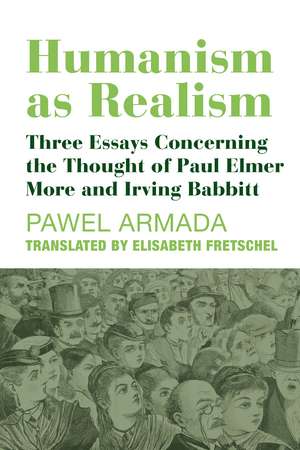Humanism as Realism – Three Essays Concerning the Thought of Paul Elmer More and Irving Babbitt
Autor Pawel Armada, Lisa Fretschelen Limba Engleză Hardback – 25 apr 2024
This is a protreptic book. Its main goal is to encourage people to undertake independent studies or more generally, simply to think independently. If we want to think for ourselves, and not like preprogrammed humanoids, we can’t do so in a vacuum. We have to lean on something. In the Author’s view, the more than century-old writings of Paul Elmer More and Irving Babbitt are perfectly suited to the role of such a support for us, living in the here and now. They make it possible for us to dig ourselves out from underneath the heaps of opinions, “principles” or “theories” that allegedly can’t be rejected, that we’re obliged to follow, but that have a paralyzing and dumbing-down effect on us, making our lives from the
outset seems like the dream of a childish old man."
––Taken from the Preface by Pawel Armada
Preț: 303.11 lei
Nou
Puncte Express: 455
Preț estimativ în valută:
58.00€ • 61.25$ • 48.27£
58.00€ • 61.25$ • 48.27£
Carte disponibilă
Livrare economică 23 decembrie 24 - 06 ianuarie 25
Livrare express 07-13 decembrie pentru 41.41 lei
Preluare comenzi: 021 569.72.76
Specificații
ISBN-13: 9781587314346
ISBN-10: 1587314347
Pagini: 290
Dimensiuni: 152 x 228 x 142 mm
Greutate: 0.6 kg
Editura: University of Chicago Press
ISBN-10: 1587314347
Pagini: 290
Dimensiuni: 152 x 228 x 142 mm
Greutate: 0.6 kg
Editura: University of Chicago Press
Notă biografică
Paweł Armada is a Polish political scientist (originally from the Jagiellonian University, Kraków) who works in the field of history of ideas. He is the author of Szkoła myślenia politycznego Leo Straussa (The Straussian School of Political Thinking, 2012) as well as contributing author and co-editor of Modernity and What Has Been Lost (St. Augustine Press, 2010) and The Problem of Political Theology (2012). His last book Humanizm jako realizm (Humanism as Realism, 2019) is devoted to the legacy of humanists Paul Elmer More and Irving Babbitt.
